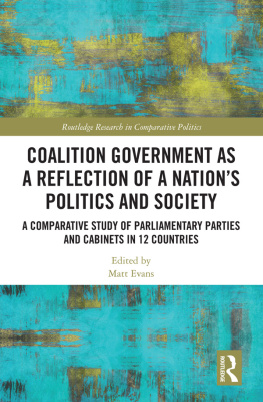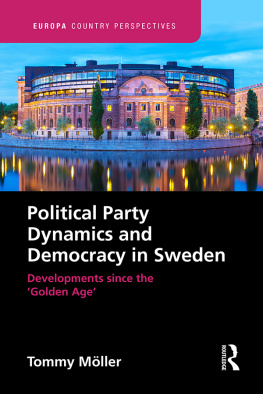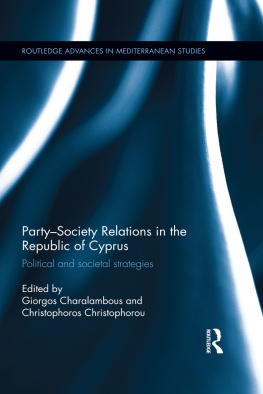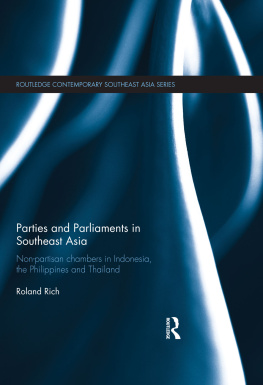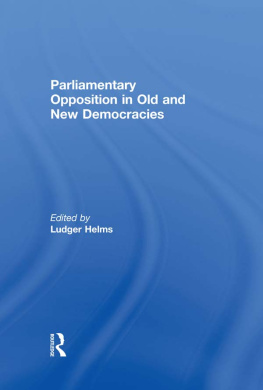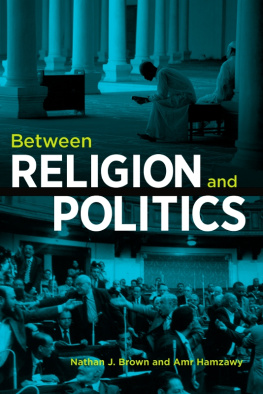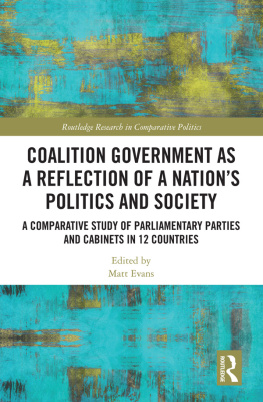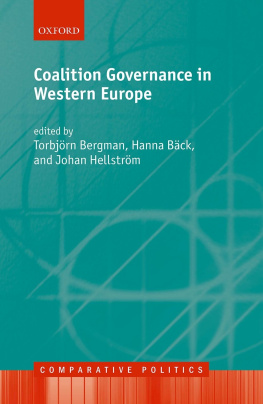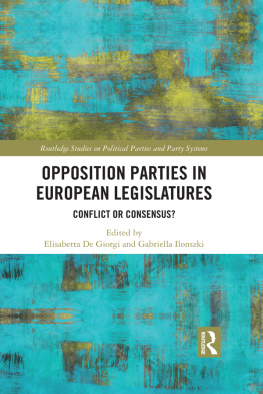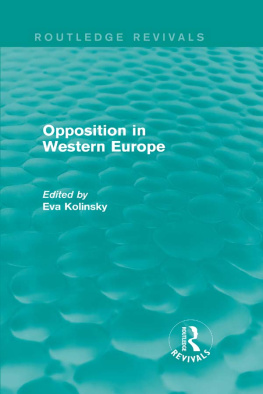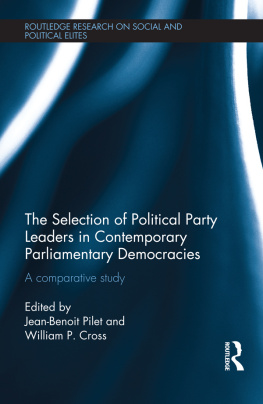1
Coalitions through a comparative politics lens
Matt Evans
What is government itself but the greatest of all reflections on human nature?
Alexander Hamilton and James Madison (1787)
Following elections in parliamentary democracies, a few news articles appear in the foreign press concerning the coming role of the prime minister, which party won the election, and perhaps some mention of negotiations to form a governing coalition. Once a government is formed, the prime minister becomes the face of the country in the eyes of most of the rest of the world, and very little attention is given to the other parties in his/her coalition or to the opposition.
However, as will be illustrated in this book, study of the coalition of parties that govern with the prime minister, as well as the parties in the opposition, helps discern a countrys most contentious cultural and societal issues about which the countrys people are most passionately divided. Unlike presidential systems, parliamentary elections rarely produce winners . Parliamentary elections generally result in multiple parties, with no single party claiming a majority of the legislature. Consequently, prime ministers, their cabinets, and the policies they pursue reflect compromises negotiated by political parties that represent different segments of the population with divergent values and interests.
The ways in which the political parties in coalition governments and their parliamentary opposition denote a countrys most controversial and divisive issues is studied in this book through twelve parliamentary democracies. The basic question guiding the analyses in each chapter is: How do the political parties in the coalition and opposition reflect a countrys political culture, societal divisions, and most critical policy debates ?
Since political culture and society comprise a unique aggregation of historical, geographical, and demographic factors, this question is addressed through examination of each countrys political parties and government in accord with the following basic assertions:
- Political institutions determine which groups and values will be represented by controlling the number and type of parties in parliament and government. A countrys electoral system and rules for forming a government are among the institutional factors most important for determining whether political parties represent socioeconomic, geographic, or demographic concerns. Institutions also determine whether smaller parties, representing niche issues, will be represented and how much influence different parties will have on decision-making.
- Political institutions are determined by, and reflect, a countrys history, cultural norms, and societal values. Institutions evolve and change in reaction to key events within a country and in accord with the citizens primary values and concerns. Thus, for example, the rules for electing parties and forming governments are often developed in reaction to a break from previous types of regimes or other historical national occurrences.
- Examining the parties in a parliament provides insight into a countrys most pivotal conflicts. Since parties usually align themselves on one side or the other of the countrys most divisive issues, the parties in the coalition and opposition reflect their societys leading schisms.
- Coalition and opposition parties reflect both traditional and contemporary cultural and societal mores and rifts. The refusal to include a particular party in a coalition is often attributable to a rejection of ideas or values that are considered unacceptable. Exclusion of parties from coalition consideration is frequently indicative of cultural values rather than competition for power.
Thus, the answer to how parties reflect a countrys political culture, societal divisions, and most critical policy debates varies in the books chapters in accord with each countrys history, values, demography, and the most pressing contemporary problems it faces. Examination of each of the countries political systems, parties, and societal schisms is carried out through the following common framework in each chapter:
- Political system institutional framework
- Political parties: representation of demographic and ideological divisions III Political culture: cleavages and policy debates
- Coalition and opposition: policy debates as a reflection of sociocultural divides
I. Political system institutional framework
Executive/legislative relations
Whether the head of government is a president or a prime minister, one of the most fundamental institutional safeguards in democratic systems is the ability of different branches of government to check each others power, prevent abuse, and protect democracy. Parliamentary systems, however, do not have the same separation between the executive and legislative branches that is normally found in presidential systems. Prime ministers, and other cabinet ministers who together make up the executive branch, have in most cases been elected to serve as representatives in the legislature. The government cabinet is therefore composed of senior legislators and leaders of the political parties that usually hold a majority of seats in parliament. While in some countries parliament members (MPs) who have been appointed to a ministerial position in the government cabinet must resign from the legislature, in most countries they continue to serve as both members of the legislative branch voting with other members of parliament and the executive branch. Additionally, as party leaders, ministers have tremendous influence on how their parties legislators vote.
Although parliamentary systems lack the separation between branches found in presidential systems, countries have developed different institutional rules in order to constrain executive power. One of the formal checks on power in parliamentary systems is the no confidence (or censure ) vote. Through a no confidence vote, a majority of members of parliament (usually just the lower house in a bicameral system) can vote a government the executive branch out of power. While this appears to be a powerful legislative check on executive power, most MPs will not vote no confidence in their own partys leaders; hence, such motions only succeed when coalitions do not maintain a parliamentary majority.
There are several variations of the no confidence vote found in the parliaments around the world. Some constitutions require a constructive no confidence vote, in which it is not enough for a parliament to vote against a government, but a majority must also support an alternative prime minister and cabinet. In cases of a divided opposition, it is very difficult to reach agreement on new leadership and hence governments with these systems are unlikely to fall. In some countries the investiture or confidence vote empowering a government requires an absolute majority, while in other countries only a relative majority (of those voting rather than of the total number of MPs) is needed. In a number of countries, the head of state may appoint a prime minister and/or government to remain in power (until the next scheduled elections), as long as there is no successful vote of no confidence. This is often referred to as negative parliamentarism since the government does not need a positive vote of support, but can be brought down by a negative vote (Bergman 1993, 57). Frequently, such systems have minority governments.
The rules for when and how different types confidence votes may be held vary between countries and are affected by both formal and informal institutions. Among formal institutions are constitutions, laws, and parliamentary rules that either strengthen opposition parties or limit no confidence motions. Informal institutions include national norms and traditions that enforce certain behaviour through shared values (Evans 2007). In many cases, such mechanisms reflect a countrys unique history and political culture. For example, in some countries, governments may resign following a legislative defeat, despite there being no formal legal requirement to do so. Additionally, limitations on parliaments ability to bring down a government often signal a preference for stability in response to historical events or a cultural inclination toward consensus building. The chapters in this book elucidate how political institutions shape and are shaped by a countrys history and values and thus determine how these are reflected in the political parties in the government coalition and its parliamentary opposition.

